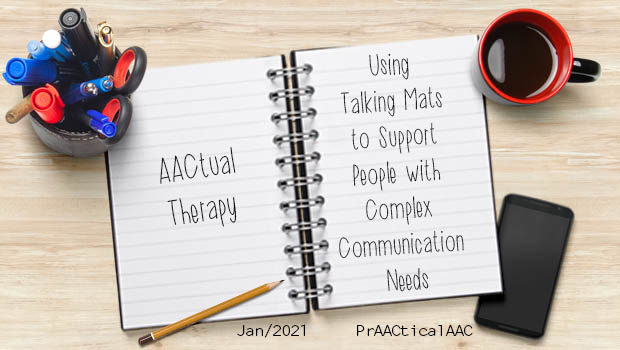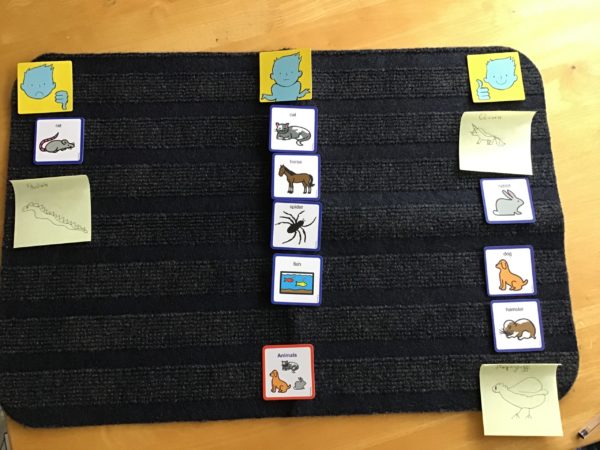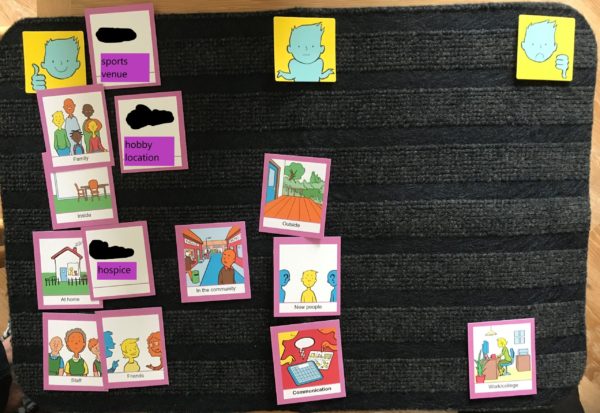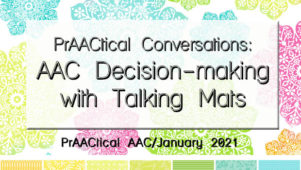AACtual Therapy: Using Talking Mats to Support People with Complex Communication Needs


Talking Mats, a powerful tool for helping people with complex needs share their thoughts and advocate for themselves, is a topic we’ve posted about before. Today, we expand that discussion and learn from SLT Katherine Small, an AAC Consultant at the Ace Centre. In the first of a 2-part series, Katherine shares her experience in implementing Talking Mats with her clients.
Enjoy!
My Experience as a Practitioner who Uses Talking Mats
Before training as an SLT, I had a variety of jobs where supporting people to share their views was key. One of the tools I used was ‘In My Shoes’ and I knew how helpful such tools were when I was trying to make sure I gave clients space to think and a means of expression during important conversations. So when I heard about Talking Mats I knew straight away that it would suit my style of working & give me another valuable tool in my SLT toolkit. In 2016 Ace Centre funded my place on the Foundation Training and my journey with Talking Mats began…
After the training my first step was practice-practice-practice! Luckily I had obliging family and friends with who I could practice my skills to build my confidence before I needed to do my first mat with a client. This led to an unexpected benefit too – some great connected conversations! For example, with my friend’s daughter, I learnt about everything from basilisks & hippogriffs to how friendships were going – opinions I’d never normally be privileged to hear if I was just round her house for tea.

Since then I’ve often drawn on Talking Mats when I wanted to support a client to express their views, especially when AAC options were being considered.
As the parent of a teenager who has aphasia said to me recently, “well I know what I think AAC might be good for – asking teachers for help, asking new people about themselves… but I don’t know if that’s important for him, does he even want to ask new people questions? does his brain work that way?”
From his Talking Mats, we now know that his main wish is for a way to share stories about his life – so that’s where we’ll start.
As an AAC Consultant, I work with clients for quite a short period of time, so I see it as part of my role to let other professionals know when a client has benefitted from Talking Mats in the hope that others will use it with them too. And not just for conversations about communication – Social Workers and Teachers etc are usually really excited when I explain that Talking Mats can be used during consultations about all manner of things.
I’ll always remember the wife of a client who has Parkinson’s plus Dementia who was bowled over by how engaged her husband was with me during his Talking Mats. She shared that it was the first time in such a long time that he’d been asked for his views as people had sort of given-up thinking he could express them; she was then really keen that other professionals start using the approach with him.

Stay tuned for Part 2 of this series, when Katherine discusses the development of the ‘Readiness for AAC’ Talking Mats resource.
About the Guest Author
Katherine Small, MA, BSc-SLT, is an AAC Consultant who works at Ace Centre in the UK. She is a Speech and Language Therapist (SLT) with a background in paediatric SEN and now specialises in AAC for both children and adults with congenital, acquired, and progressive conditions.
Katherine co-authored the Pragmatics Profile for AAC and often shares AAC support videos on YouTube, such as this one. You can follow Ace Centre on Twitter @AceCentre, Instagram @acecentreuk, Facebook @AceCentre.uk, and YouTube acecentre.
Filed under: Featured Posts, PrAACtical Thinking
Tagged With: AAC assessment, AAC user, AAC User Perspectives, participation
This post was written by Carole Zangari




